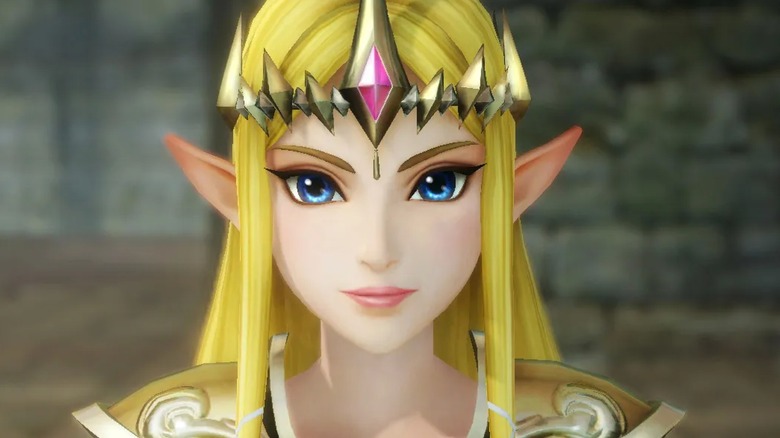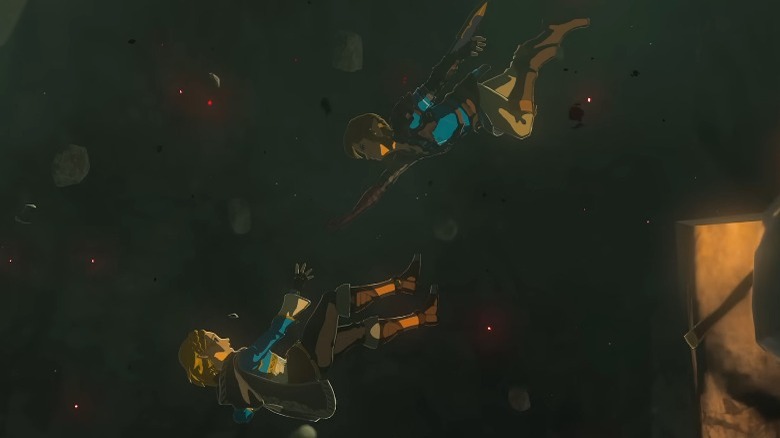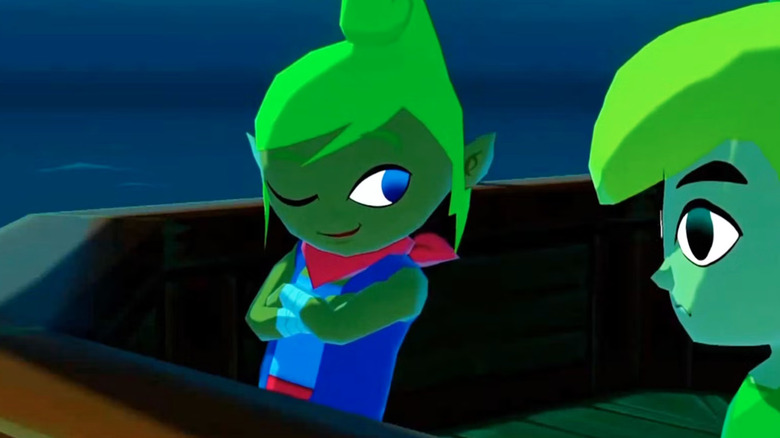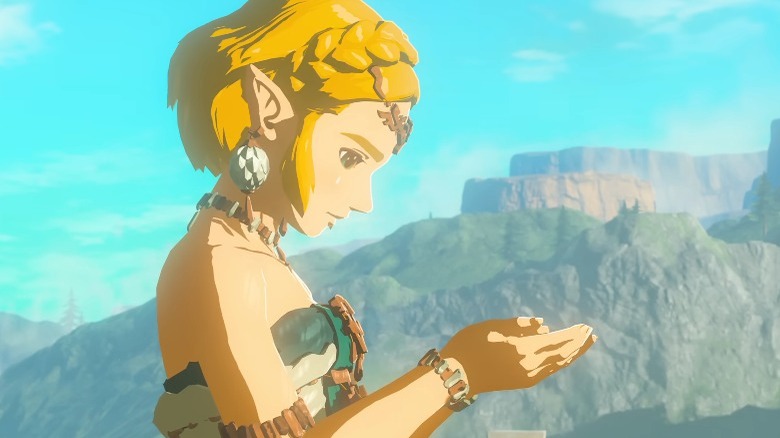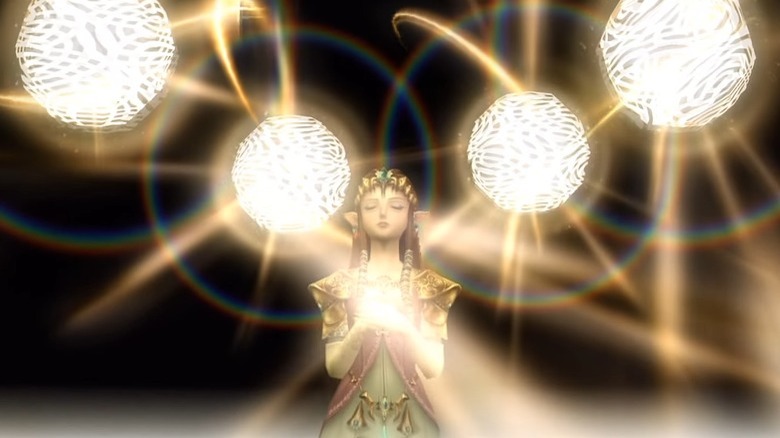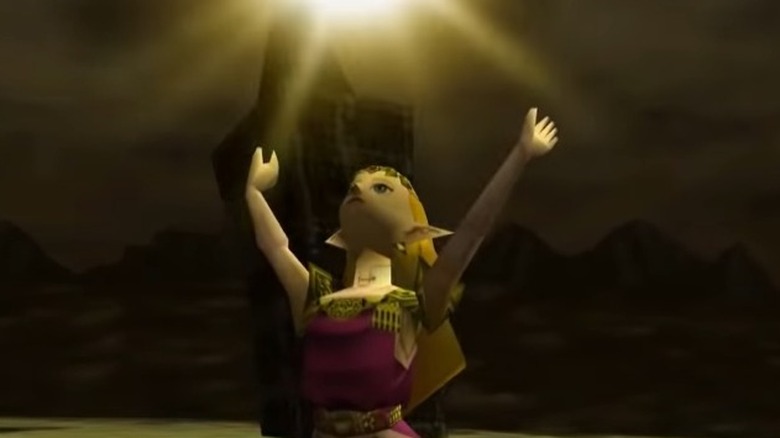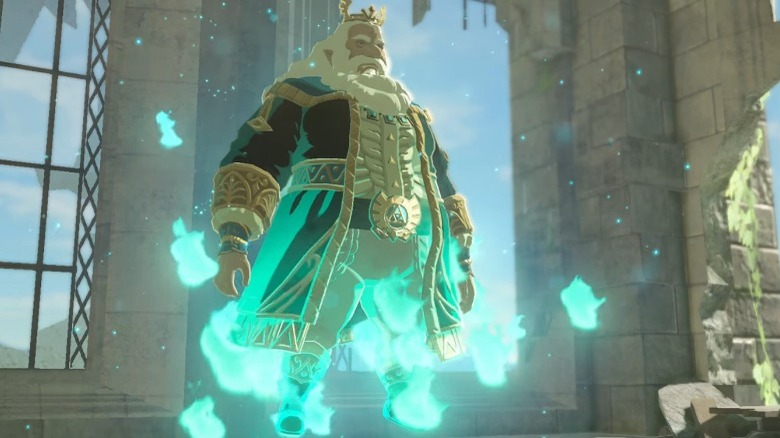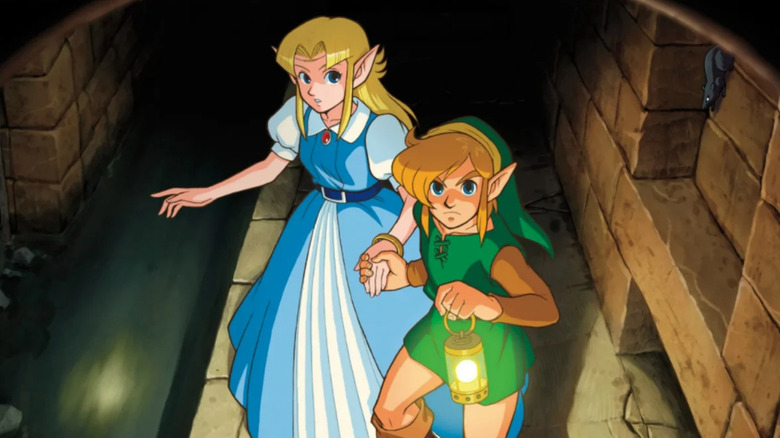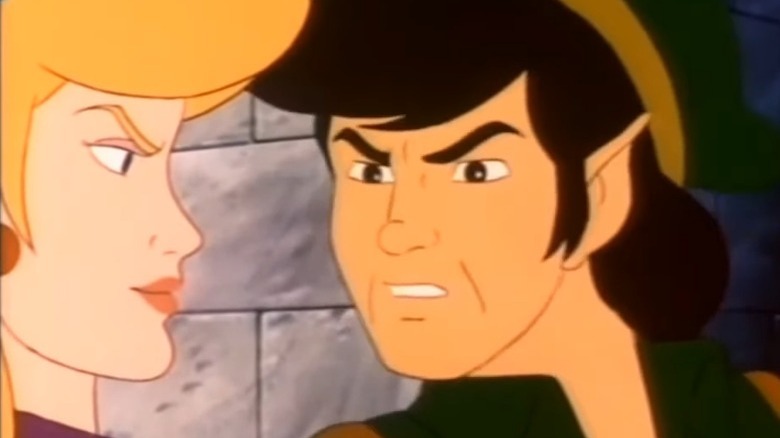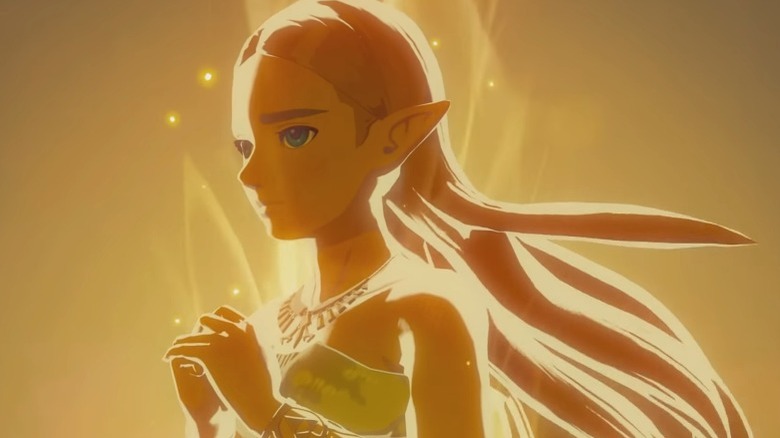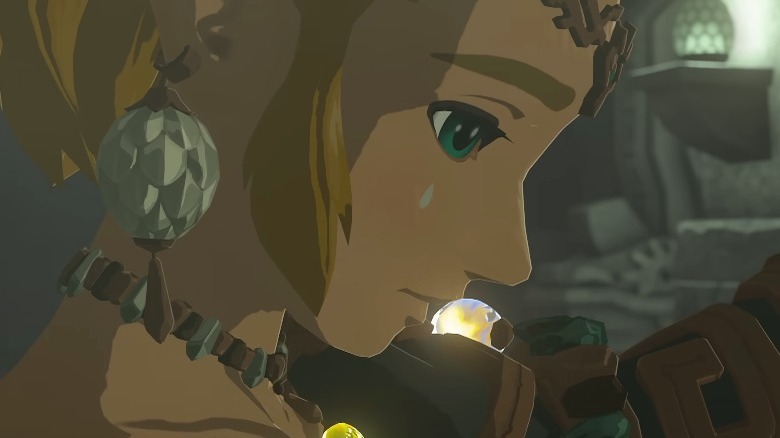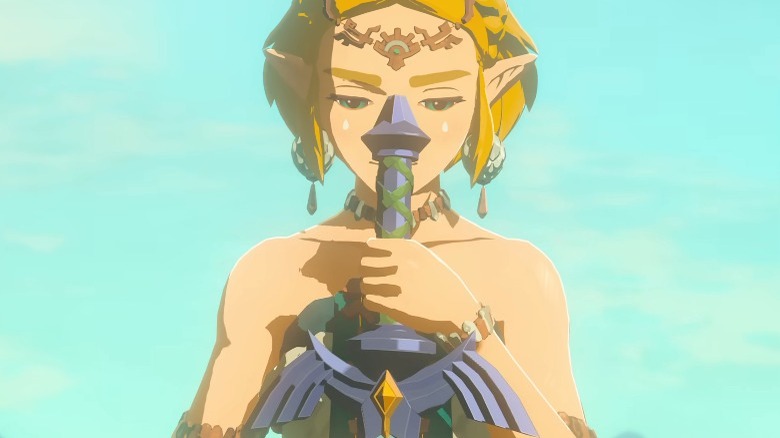Things Only Adults Notice About Princess Zelda
"The Legend of Zelda" series has been around for a long time, and the franchise continues to delight fans old and young with the mysterious land of Hyrule. The games take place across thousands of years, but every one has a green-clad hero named Link and a powerful princess named Zelda at the heart of one cataclysmic event or another.
There's a lot of beauty to be found in the simplistic storytelling of the "Zelda" games. Though there are plenty of memorable characters and emotional beats to be discovered, every game has a relatively basic plot that sees players hunting down items and gathering enough strength to defeat an enemy threatening Hyrule. There's just enough lore in every title to fuel wild fan theories that keep players engaged with the series while they wait for the next installment.
You don't often have to spend a ton of time digesting the stories in "Zelda" games. They're all straightforward enough for kids to follow, but there's also deeper layers to everything that only the older players in the fandom will pick up on. If you haven't played "Zelda" since the Nintendo 64 days, there's probably plenty you don't know about the titular princess, but we're here to break down everything that only the series' grown-up fans notice about Zelda.
Zelda has a weird relationship with Link
Link and Zelda have a relationship that spans decades in our world and millenia in their own. Video game relationships, particularly ones that kicked off in the late 80s, tend to be pretty straightforward. (Just look at Mario and Peach.) There's a hero and a princess who needs to be rescued, and when evil in the land is finally put to rest, the hero and the princess finally get to be together. Things have never quite played out that way between Link and Zelda.
The "Zelda" timeline is anything but straightforward, which can make keeping track of Link and Zelda's relationship a little difficult. Every time a new conflict faces Hyrule, Link and Zelda inevitably meet, but they aren't necessarily the same people in every plot.
In the original "Legend of Zelda," their relationship plays out as a stereotypical hero/princess dynamic. In other games like "Ocarina of Time," Zelda almost acts as a mentor for young Link. Sometimes the two are just good friends, like in "Wind Waker" and its sequels and spin-offs. Link and Zelda have a relationship that literally changes with the times. The only constant is that the two of them are destined to meet and help save Hyrule from disaster in one way or another.
She's constantly having identity crises
Everyone struggles with figuring out who they are and what kind of life they want to lead. Poor Zelda typically has to find a way to answer those questions while also contending with magical threats and thousands of years of history regarding previous princesses in her position. Combine that with the pressure of actually leading an entire nation of people, and you've got the perfect recipe for an identity crisis.
Sometimes Zelda decides that the best way to solve her problems is to stop being Zelda altogether. For a member of a royal family, Zelda is incredibly crafty, pragmatic, and quick on her feet. In "Ocarina of Time," she realizes that the best way to avoid Ganondorf is to take on a disguise. She hides herself by pretending to be a Sheikah warrior named Sheik (alright, maybe she could have gotten a bit more creative with the name, but it works). Her Sheik identity has made its way into more than a few "Smash Bros." games, further muddying the legitimacy of this secret identity.
Zelda had a much more prolonged case of identity confusion in the "Wind Waker" timeline, though. In those games, Zelda travels the world as the pirate Tetra. She's so wrapped up in the pirate lifestyle that she doesn't uncover her true identity until the King of Hyrule lays it all out for her.
She might not be the best ruler
In most every version of Hyrule that we've ever seen, Zelda has been part of the royal family. That doesn't necessarily mean that the family always has a Zelda around, though. Maybe Zelda just has the misfortune of always being alive when a new disaster rips Hyrule apart. Either way, after well over a dozen appearances in various games, we have a large enough sample to confidently say that Zelda might not be a very good leader.
The most obvious mark on Zelda's record is that every time she's a princess, some new catastrophe strikes. It's not fair to blame her for the existence of Ganondorf and other antagonists, but her response to them isn't that great. Sure, Zelda almost always ends up getting directly involved with defeating Hyrule's enemies, but we don't get to see her spending much time tending to the land's inhabitants.
When Hyrule is peaceful, Zelda has her own hobbies and concerns. The Zelda of "Breath of the Wild" has a major interest in studying science, for example. On the other hand, when chaos breaks out, Zelda is a big picture thinker. She's great at taking down sorcerers, but not so great at helping out the little guys. It could be that she's a more effective adventurer than princess.
She could save Link if she needed to
Most people think of Link as the hero of the "Legend of Zelda," and it's easy to see why. Link is always the player character, so in every game he's at the center of whatever conflict is plaguing Hyrule. On a number of occasions, Zelda herself ends up in a tight spot and needs Link to rescue her. Without Link, Hyrule would have fallen years ago, so he's obviously a hero — but he's not the only one.
If Link ever found himself restrained by one of Ganondorf's spells, he could rest assured that Zelda would be able to save him. Zelda's never been much of one to concern herself with the ins and outs of running a nation, but Hyrule should be thankful for that. Zelda's not only an accomplished fighter, but she also has access to a handful of powerful magical abilities.
There have been plenty of times when Zelda has played a pivotal role in saving the kingdom. She helped Link defeat Ganon before trapping Ganondorf in the Sacred Realm in "Ocarina of Time." Her Light Arrows turn the tide in games like "Wind Waker" and "Twilight Princess." And, setting canon aside for a moment, we all know that she can absolutely tear things up in a game of "Super Smash Bros."
Her powers should prevent most problems in Hyrule
Hyrule is a land of goddesses, mages, and all kinds of strange creatures. Around every corner there's a new powerful item or shocking ability to discover, and over the course of the franchise's history, every game has raised the stakes and upped the power level of its main characters. Other series might have difficulty creating believable conflicts in a world that's so overflowing with magic, but "The Legend of Zelda" works so well because it left behind believability ages ago.
Let's face it: Zelda's powers should prevent any kind of problem from ever happening in Hyrule. Sure, all of the series' biggest antagonists are wizards and mages with incredible magic of their own, but in nearly every game, Zelda has to figure out a way to use her own power (combined with Link's strengths) to beat them. At this point, shouldn't Zelda be stronger with each passing game, able to simply Light Arrow her way through any mad mage who thinks they can become the new god of Hyrule?
All of that doesn't even address the fact that Zelda manipulated time itself at the end of "Ocarina of Time." If Zelda can send Link back in time, surely she can use that same power to stop any would-be invader. Some might point out that Zelda's time magic caused its own problems in the land of Hyrule — not to mention the problems it caused for people who keep track of the franchise's continuity. If only "Legend of Zelda" scholars had the same command of time.
Her family might be a little corrupt
We've already talked about how Zelda has never really proven herself to be a good leader. Now it's time to take a look at Zelda's family. They've ruled Hyrule since the creation of the kingdom. Their powerful position in the kingdom is mostly credited to their connection to the Triforce and the goddesses that created it, but it's worth considering whether or not the people of Hyrule are actually happy with their royal family.
It's hard to imagine the average citizen of Hyrule being overly enthusiastic about Zelda's family. They've proven over and over and over again that they aren't capable of protecting Hyrule from several kinds of threats. In the era that leads to "Wind Waker," they even allowed the kingdom to be flooded. How many of us could repeatedly fail at doing our job so badly that the world nearly ends and still go back to work the next day, much less the next century?
Nintendo is probably not going to create a "Legend of Zelda" game about the citizenry rising up against their incompetent royal family, but maybe it should. Hyrule's monarchs has held onto their power for too long, and the people of Hyrule honestly deserve better. Besides, isn't living under a monarchy for thousands of years inherently unfair to regular people in the kingdom?
Zelda's given way too much responsibility for her age
Okay, okay, it's easy to be hard on Zelda sometimes. She's a member of a royal family that's watched the near-destruction of Hyrule multiple times. And anyone without a boat in the "Wind Waker" timeline would probably like to argue over the exact definition of "near" in that previous sentence. That said, it's also easy to be too hard on Zelda and to forget that in many of her appearances, she's really just a kid who's in over her head and trying to help everyone.
Zelda's parents know that they live in a magical world fraught with danger, but that doesn't stop them from laying an overwhelming amount of responsibility on their daughter. We could talk about all the times that Zelda somehow finds herself in charge of working alongside Link to save Hyrule when there should be perfectly capable adults nearby, but there's actually a better example of her family giving her too much to do.
In "Four Swords," Zelda and Link are both kids. Despite that, Zelda's family puts her in charge of guarding the Four Sword Sanctuary and preventing the powerful mage Vaati from escaping. Obviously that doesn't go well. Vaati escapes and takes Zelda prisoner. Do the adults act at that point? No, it's once again up to Link and Zelda to save themselves.
She deals with a lot of toxic masculinity
By this point it should be clear that Zelda has a ton of problems to deal with, from neglectful parents to world-ending curses. There's something that links (no pun intended) every issue that Zelda faces, and it's toxic masculinity.
All of Zelda's biggest enemies are power-hungry men who want to use her to advance their own agenda. In "The Minish Cap," Vaati plans to sacrifice Zelda to capture her sacred Light Force. In "Spirit Tracks," Chancellor Cole uses Zelda's body to summon Malladus, the game's main boss. In "A Link Between Worlds," the sorcerer Yuga kidnaps Zelda and transforms her into a painting. The pattern here should be pretty clear. A lot of evil dudes in Hyrule see themselves as being entitled to Zelda's body or very life.
Obviously, all those are examples of genuine villains using Zelda to further their plans. Antagonists are supposed to be toxic characters, but the heroes of Hyrule must have a better track record, right? Link definitely shows off his heroic traits more often than not, but he's not entirely innocent here. In "The Legend of Zelda" cartoon, Link spent way too much of his time pestering Zelda for a kiss – and any time she did something he disagreed with, he used a certain meme-able phrase to try and tear her down. Maybe Zelda really would be better off on her own.
She's far less of a damsel in distress than her reputation suggests
Kids and casual fans of "The Legend of Zelda" often imagine the games as stories in which Link is always saving the day and coming to Princess Zelda's rescue. That's partly because Zelda often get lumped in with another Nintendo princess. Princess Peach is pretty often a true damsel in distress, though adults will notice that Princess Peach doesn't necessarily stay in that box all the time either.
There are certainly games, like "A Link to the Past," where Zelda is in need of rescue. More often than not, however, Zelda is a perfectly capable warrior who's more of a hero than a victim. Zelda's powers often play an integral role in defeating the main villain. If it weren't for Zelda's help, Link wouldn't come out on top in games like "Ocarina of Time," "Four Swords Adventures," or "Twilight Princess."
Anyone who pays attention to the deeper lore in certain games also gets to see examples of Zelda being a total badass. "Breath of the Wild" in particular shows two great examples. 10,000 years before the game takes place, a version of Zelda fought in battle against Calamity Ganon. The game's current version of Zelda actually fights Ganon, entirely by herself, for a hundred years. That really puts Link's one-off boss fight against him to shame.
Some writers think she's tougher than others
There have been countless versions of Zelda throughout the long history of Hyrule. All of them share a family history, a certain resemblance, and, of course, a name, but they're all distinct people with their own unique personalities and skill sets. That's one reason why Zelda's exact characterization is so hard to pin down.
Another reason Zelda's role in the franchise's mythos changes so frequently is that some writers clearly have their own opinions about how tough she is. The writer's of "Ocarina of Time," for example, gave Zelda a ton of agency. She's an equal hero to Link, and when you consider that Link sleeps through a majority of the game's timeline, Zelda comes out looking like the actual protagonist of the story. On the other hand, in "A Link Between Worlds," Zelda is mostly just there to be rescued.
It's not just video game writers who have trouble deciding how heroic Zelda should be, however. The first episode of "The Legend of Zelda" cartoon presents a version of the Princess whose biggest concern is that Link never helps clean up. Then in episode 5, Zelda is fighting bad guys and slinging bombs alongside the green-clothed hero. Every version of Zelda throughout time might be different on purpose, but you'd expect a bit more consistency within those eras.
She should have gotten a promotion by now
Despite all the problems that Zelda has run into as a ruler, not to mention all the deeply ingrained problems that Hyrule clearly has with its monarchy, we should all be able to agree on one thing: Zelda should have become queen by now. How many times can a person help save the world without getting any kind of real reward? And how long can someone remain a princess, anyway?
Between all the "Legend of Zelda" games, cartoons, spin-offs, and tie-ins, fans have been exposed to over 10,000 years of Hyrulian history. They've repeatedly met Princess Zelda and her various alternate identities, but they've yet to meet a real Queen Zelda. Time and time again, Zelda is forced into the thankless princess role, saddled with all of the responsibility and none of the privileges that come with true leadership. We almost got Queen Zelda in "Hyrule Warriors," but Nintendo changed its mind at the last second.
Contrarians might try to say that Zelda becomes a queen after the credits roll in some scenarios, though. The ending of "Breath of the Wild" leaves Zelda overseeing the restoration of Hyrule, and one could easily assume that she takes the throne sometime after the events of the game. We aren't here for assumptions, though. "The Legend of Zelda" has been around for well over thirty years, and fans that have been there since the beginning are ready to see a real coronation, or even a game where Zelda herself is the main protagonist.

